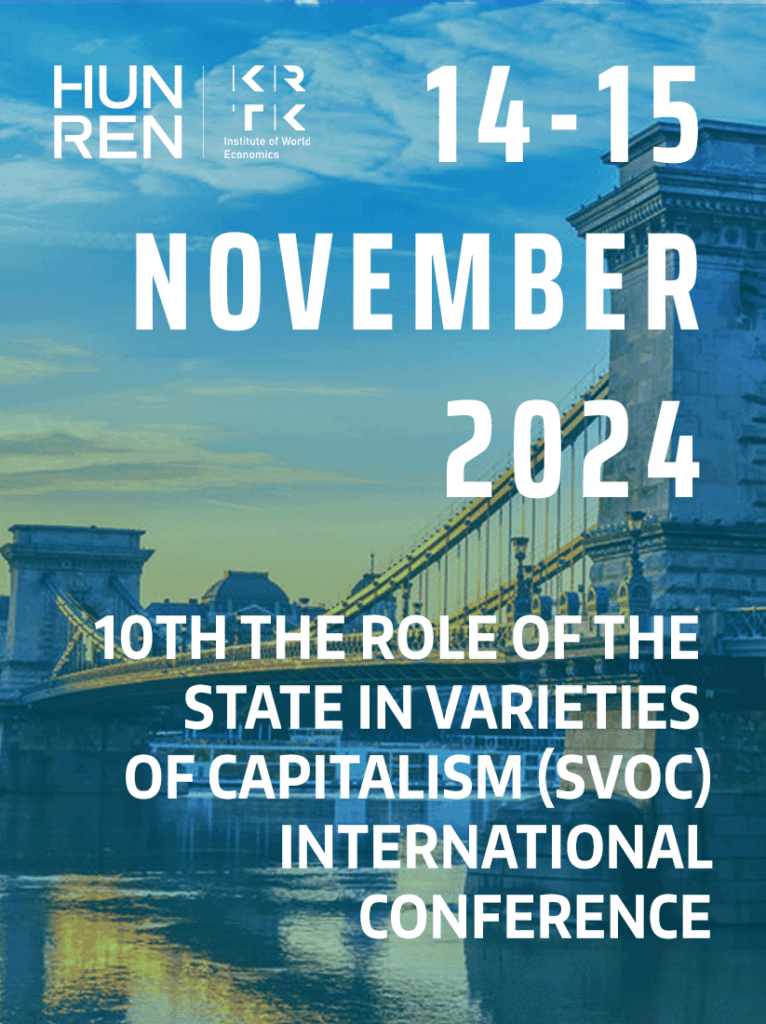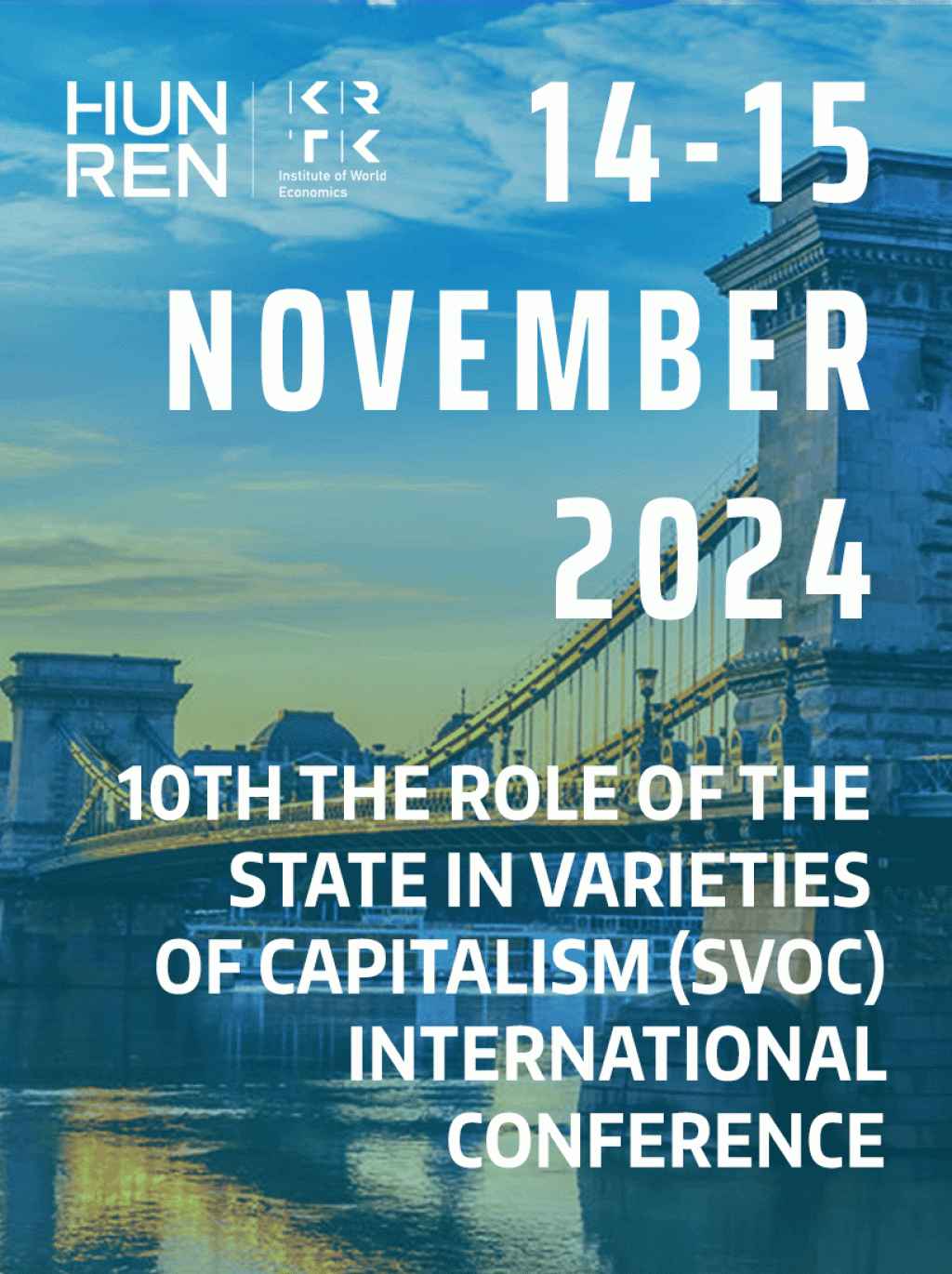10th The Role of the State in Varieties of Capitalism (SVOC) conference
The Institute of World Economics, the Centre for Economic and Regional Studies HUN-REN organised the 10th ‘The Role of State in Varieties of Capitalism’ conference on 14-15 November 2024 with the support of EACES. The annual international conference focused this year on ‘The Changing Global Economic and Business Environment: Policy Challenges’, and took place in person in Budapest, in the Research Centre for Humanities, while the plenary sessions were streamed online, to enable wider participation.
The SVOC international conference series has been addressing the different aspects of state interventionism in the economy across the different regions of the world for the past ten years. The rationale behind this year’s topic was that the global economic and business environment has undergone substantial transformations during the past years (maybe decade) paved by multiple crises and unexpected shocks. This resulted in new policy challenges from the global to the national and regional levels, while actors are more vulnerable and face greater pressure to adapt and improve their resilience. This led to the renewed interest in analysing the role of the state in supporting the green transition, structural change, as well as increasing the economic and social resilience of national economies in times of crises.
This shifting environment also challenged core principles and values that have long been universally accepted and guided economic policies in recent decades. Novel ideas to interpret ongoing changes are urgently needed to effectively address newly arising challenges that (re-)entered the agenda of academic and policy debates. In this vein, the conference aimed to contribute to both theoretical debates and bringing together more applied research on contemporary models of capitalism, with a special focus on green transition, structural change and social resilience. This goal was approached by the wide scale of topics covered during the two-day long parallel running conference panels related to industrial policies, welfare states and green capitalism (among others).
The keynote speech was held by Andreas NÖLKE, Professor of Political Science at Goethe University (Frankfurt) and Senior Researcher at the Leibniz Institute for Financial Research SAFE. He talked about „State Capitalism vs. Neoliberalism in the Global Financial Order: A Second Image IPE Perspective”. In the light of the BRICS summit in Kazan on 24 October 2024, the keynote lecture could not be more timely and relevant. It discussed the existence and prospects of the state-capitalist alternative to neoliberal global financial order in a theoretical framework (called the second image IPE), that combines international and comparative political economy perspectives. The thought-provoking and insightful presentation was followed by fierce discussions on pros and cons of state capitalist realities.
This year the SVOC conference also hosted a roundtable discussion on “The challenges of de-risking in contemporary EU-China relations” co-funded by the European Union, the European Policy Centre. Chaired by Ágnes Szunomár (Institute of World Economics HUN-REN), the panelists were: Varg Folkman (European Policy Centre), Andreas Nölke (Goethe University and Leibniz Institute for Financial Research SAFE), Samuel Rogers (The Open University) and Csaba Wolf (Vice President of SEMCORP Hungary Ltd. & Vice President of ChinaCham Hungary). They discussed the contemporary challenges of the EU-China relationship and the extent to which de-risking is possible, while bringing together and contrasting academic, policy and corporate perspectives. The roundtable discussions focused on three main questions: 1. what has it really meant for Europe to ‘de-risk’ its relationship with China so far; 2. what is the state of play now as a new European Commission takes over (with Trump being elected and Hungary getting more and more open towards China); and 3. how a renewed comprehensive European approach to China could realistically look like? The roundtable discussion was also followed by numerous questions and comments, and a very intense debate on future prospects evolved.
The second day of the conference hosted a plenary roundtable discussion and book launch, besides the already mentioned parallel panels. The book entitled “The Economics of Regional Integration” is forthcoming in 2025 by Routledge. The volume was first presented by Sándor Gyula Nagy (Corvinus University Budapest), who is the editor and author of several chapters. Inspired by the work of Prof. Tibor Palánkai, the book aimed at exploring how the participation in regional integration affects the socio-economic development of its member states (individually and in comparison to each other). Oleg Tankovsky (Ludovika University of Public Service) presented the new methodological framework, developed by the Authors, for measuring the efficiency of regional integration and the integration profile of member states. The volume includes ten case studies, which offer a comparative analysis of these integrations spanning four continents: The Americas, The European Union, Africa and Asia. Out of this rich collection, Anikó Magasházi (Institute of Advanced Studies Kőszeg) presented the case of the ASEAN (Association of Southeast Asian Nations), while Sándor Gyula Nagy provided some insights from the chapter focusing on the European Union. The book launch was followed by intense discussion related to both the applied methodology and the case study experiences.
The two-day conference gave place to almost 40 presentations and two roundtable discussions, delivered by 50 scholars, from ten different countries from all over the world.




